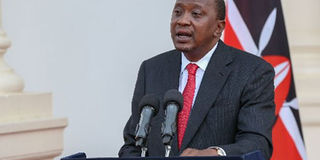Uhuru can take lessons from Obama in finding exit strategy from Somalia

President Uhuru Kenyatta issue a statement on the Garissa University Campus attack at State House, Nairobi. FILE PHOTO | NATION MEDIA GROUP
What you need to know:
- The Iraq adventure has been little short of catastrophic, not just for America, but for all the other countries in the world bearing the burden of growing radicalisation among Muslim youth.
- Kenya is simply too historically open a society, too ethnically divided a place, to effectively counter blood-thirsty marauders such as the Shabaab.
- It is fashionable to say we should stand up to terror and fight to the end. But maybe only dictatorships such as Ethiopia can actually keep their people safe when faced with a determined and barbaric enemy such as this.
Test your enemies. That, distilled, seems to be the Barack Obama doctrine. And it is working quite well for the man Kenya will host in July.
So Iranian leaders describe America as the “Great Satan”. Their agents have carried out countless terror atrocities that have taken scores of American lives down the years.
The Ayatollah and his friends humiliated Washington when they toppled America’s puppet in Tehran in 1979. Tehran, moreover, is the greatest strategic foe to America’s main ally in the Middle East, Israel.
But it is obvious that America can’t afford another war with a Muslim country. The Iraq adventure has been little short of catastrophic, not just for America, but for all the other countries in the world bearing the burden of growing radicalisation among Muslim youth.
So what does Obama do? He decides to test the enemy. The framework deal agreed with Iran and major world powers has been described by commentators such as Roger Cohen of the New York Times as “the most important American diplomatic achievement” since the accord which ended the war in Bosnia.
In return for the easing of sanctions, world powers will have the right to enforce a rigid inspection regime to ensure Iran does not develop nuclear weapons. If the test fails, the implication is that America will explore the military option to stop Tehran’s nuclear programme.
We can take lessons from this in figuring out an exit strategy from Somalia. Let’s face it, this war has now proved too costly.
Kenya is simply too historically open a society, too ethnically divided a place, to effectively counter blood-thirsty marauders such as the Shabaab.
A friend from abroad observed that while other nations rally together in the immediate aftermath of an attack and open an inquest a few days later, Kenyans turned their guns on each other on social media immediately after the Garissa killings.
This is great territory for the Shabaab to operate in. This “war on terror” business is simply too murky and complex for Kenya.
STRATEGIC RETREAT
This is not an easy thing to say but it might be time for a strategic retreat. It makes sense for Kenya to test the enemy.
Organise a phased withdrawal from Somalia, empower allies who operate in southern Somalia and warn the Shabaab that Kenya will not tolerate any further atrocities on its soil.
This is not to endorse the easy opportunism of the Cord leaders who we learn from WikiLeaks were enthusiastic supporters of the war project.
But some moments call for a dose of realism. This has been one of the toughest stories I have covered because the Shabaab, in rampaging through those college hostels, snuffed out not just innocent young lives but the futures of whole families and clans.
Stanley Maina Waiharo, a tailor from Murang’a, sold all his cows and took a loan of Sh200,000 to get his first-born son, John Maina Mwangi, through high school and on to university – the first person in his wider clan to achieve college education.
“This boy. Oh this boy. This boy was going to help us board a plane one day,” Mary Oloo, the aunt of Peter Odhiambo, a 19-year-old economics student, lamented.
Linda Kawira and her cousin Edwin Gitonga were tortured by the uncertainty of not knowing the fate of their kin, Mark Dennis Mutuma.
The cost of this war, a war which many Kenyans supported when it was launched, has just become too steep.
It is fashionable to say we should stand up to terror and fight to the end. But maybe only dictatorships such as Ethiopia can actually keep their people safe when faced with a determined and barbaric enemy such as this.
In the 1960s, the Americans “declared victory and left” Vietnam when they got bogged down there. Now they are leaving the people of the Middle East to their own devices.
Kenya should do the same and concentrate on keeping our borders safe internally and building a prosperous future while the Somali people decide the fate of their own country.
Withdrawing and demanding that the Shabaab cease their attacks would test whether they are rational players. If it fails, then we can engage in a death embrace and fight to the end.
This murky “war on terror” business should be left to the superpowers and their foes.





